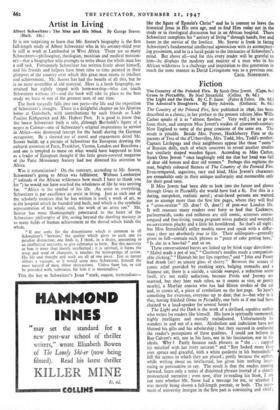Artist in
Living
Albert Schweitzer : The Man and (Black. 18s.)
His Mind. By George Seaver.
IT is not surprising to learn that Mr. Seaver's biography is the first full-length study of Albert Schweitzer who in his seventy-third year is still at work at Lambarene in West Africa. There are so many Schweitzers—philosopher, theologian, musician and medical mission- ary—that a biographer who attempts to write about the whole man has a stiff task. Fortunately. Schweitzer has written freely about himself, and his friends and helpers have from time to time painted in their glimpses of the country over which this great.man roams in intellect and achievement. Mr. Seaver has had the benefit of all this, but he is no mere assembler of old material. Here is a fresh biography, re- strained but rightly tinged with hero-worship—who can touch Schweitzer without it?—and the book will take its place as the best study we have of one of the greatest men of .our time.
The book naturally falls into two` parts—the life and the exposition of Schweitzer's thought. There is a delightful chapter on his Alsatian home at Gunsbach, with contributions by such friends as Lady Pauline Kirkpatrick and Mr. Hubert Peet. It is good to know that the house Schweitzer built is safe, although Bartholdi's figure of a negro at Colmar—one of Schweitzer's original inspirations to service in Africa—was destroyed (except for the head) during the German occupation. By a shrewd use of travel and engagement detail Mr. Seaver builds up a picture of Schweitzer the European drawing the cultural attention of Paris, Frankfort, Vienna, London and Barcelona ; and one is tempted to muse on what would have happened to him as a leader of European thought if the little green-covered magazine of the Paris Missionary Society had not directed his attention to Africa.
Was it renunciation? On the contrary, according to Mr. Seaver, Schweitzer's going to Africa was fulfilment. Without Lambarene (" solitude of the African wilderness how much I have to thank you for ") he would not have reached the wholeness of life he was striving for. "Africa is the symbol of his life. An artist in everything, Schweitzer is par excellence an artist in living. Just as each one of the scholarly treatises that he has written is itself a work of art, so is the hospital which he founded and built, and which is the symbolic representation of his whole soul, the work of an artist too." Mr. Seaver has most illuminatingly penetrated to the heart of the Schweitzer philosophy of life seeing beyond the dazzling mastery in so many fields of human achievement to the thread which binds the whole.
" If one seeks for the denominator which is common to all Schweitzer's 'heresies,' the quality which gives to each one its peculiar distinction, one finds it, I think, in a desire, amounting to an intellectual necessity, to give substance to form. But this necessity in him is more than merely intellectual ; it is spiritual, it forms the warp and woof of character, it touches the mainsprings of action. His life and thought and work are all of one piece. Just as nature abhors a vacuum, so it would seem does Schweitzer, himself the most natural of men, abhor abstractions. Unless form has, or can be provided with, substance, for him it is meaningless."
This the key to Schweitzer's Jesus " stark, august, tremendous-
like the figure of Epstein's Christ" and he is •content to leave the historical Jesus in His own age, and to find Him today not in the study or in theological discussion but in an African hospital. There Schweitzer completes his " artistry of living " through hands feet and heart in the service of the lowliest. Mr. Seaver is frank in facing Schweitzer's fundamental intellectual agnosticism with its accompany- ing pessimism, and he is a lucid guide to the intricacies of Schweitzer's mind. But above all—and for this every reader will be grateful to him—he displays the modesty and majesty of a man who in his African wilderness is a challenge and inspiration to this generation in much the same manner as David Livingstone was to a previous one.
CECIL NeRYrtccTT.


































 Previous page
Previous page